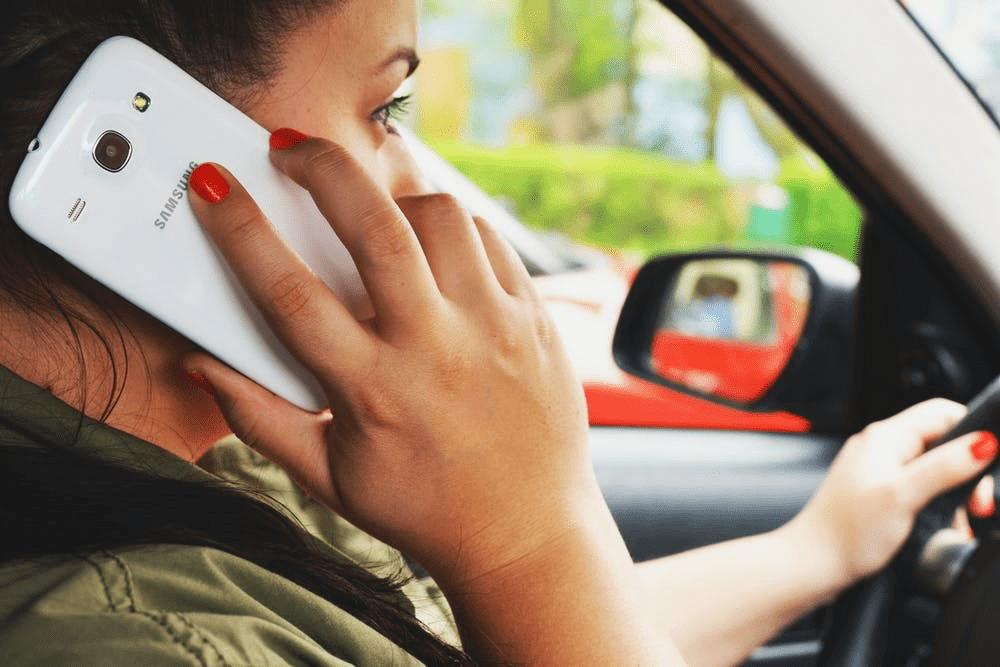Driving and Dialing
داستان کوتاه درباره ی تلفنی صحبت کردن در حال رانندگی

Driving and Dialing

Some sentences have been extracted from the text. Put the correct sentence into the gap. One sentence is extra. Write A, B, C, … in the gap
A These can include anything that reduces driver concentration on road hazards such as drinking coffee or talking with another passenger.
B Four states -- Colorado, Delaware, Maryland and Tennessee -- banned their use by young drivers in 2005.
C may even be increased, by the use of hands-free sets.
D cellphone can also be hazardous to our heart and brain, so people can have heart attack while driving.
E took 17 percent longer to regain the speed they lost when they braked.
F compared with approximately 4.3 million in 1990.
G Second, people can become so absorbed in their conversations that their ability to concentrate on the act of driving is severely impaired.
In the United States over 190 million people used cell phones as of June 2005, Increased reliance on cell phones has led to a rise in the number of people who use them while driving.
There are two dangers with driving and using a cell phone. First, drivers must take their eyes off the road while dialing.
Since the first law banning hand-held cell phone use while driving was passed in New York in 2001, there has been debate as to the exact nature and degree of hazard. At first safety experts focused on the problem as part of the larger one of driver distractions in general.
Now there is increasing evidence that the dangers associated with cell phone use outweigh those of other distractions. Safety experts also acknowledge that the hazard posed by cell phone conversations is not eliminated, and
A government study released in June 2005 indicates that the distraction of cell phones and other wireless devices was far more likely to lead to crashes than other distractions faced by drivers. Researchers tracked 100 cars and their drivers for a year and concluded that talking on cell phones caused far more crashes, near-crashes and other incidents than other distractions.
Many studies have shown that using hand-held cell phones while driving can constitute a hazardous distraction. What about a hands-free phone? Studies show the use of hands-free sets may even be worse.
A study from the University of Utah found that motorists who talked on hands-free cell phones were 18 percent slower in braking and An earlier University of Utah study by the same researchers found that drivers talking on hands-free cell phones were less likely to recall seeing pedestrians, billboards or other roadside features.
Cell phones play an integral role in our society. However, the convenience they offer must be judged against the hazards they pose. The number of state legislatures debating measures that address the problem of cell phone use while driving continues to rise. In May of the same year, the city of Chicago banned the use of hand held cell phones while driving. The U.S. is not the only country with laws about cell phone use while driving. As many as 40 other countries restrict or prohibit the use of driving and dialing.
| Word | Meaning | Example |
|---|---|---|
| Reliance (noun) | when someone or something is dependent on someone or something else | the country’s reliance on imported oil. |
| Impaired (adjective) | damaged, less strong, or not as good as before | impaired vision
|
| debate (verb) | discussion of a particular subject that often continues for a long time and in which people express different opinions | The new drug has become the subject of heated debate within the medical profession. |
| Hazard (noun) | something that may be dangerous, or cause accidents or problems | Polluted water sources are a hazard to wildlife.
|
| Distraction (noun) | something that stops you paying attention to what you are doing | I study in the library as there are too many distractions at home |
| outweigh (verb) | to be more important or valuable than something else | The advantage of this job outweighs the disadvantages. |
| acknowledge (verb) | to admit or accept that something is true or that a situation exists | The family acknowledge the need for change
|
| eliminate (verb) | to completely get rid of something that is unnecessary or unwanted | The credit card eliminates the need for cash or cheques |
| conclude (verb) | to decide that something is true after considering all the information you have | After all the investigations, they concluded that he is guilty. |
| Incidents (noun) | an event, especially one that is unusual, important, or violent | Roads were sealed off because of a major incident. |
| Constitute (verb) | if several people or things constitute something, they are the parts that form it | The rise in crime constitutes a threat to society. |
| Regain (verb) | to get something back, especially an ability or quality, that you have lost | The family never quite regained its former influence. |
| Integral (verb) | forming a necessary part of something | Vegetables are an integral part of our diet
|


